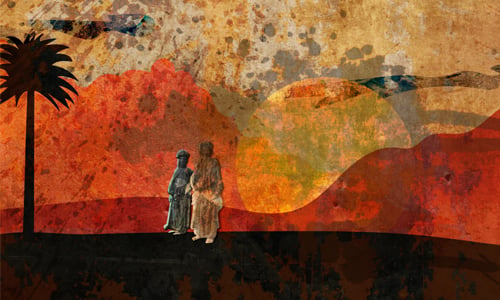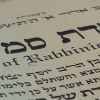Yaakov Abulafia and Yitzchak Shraga were both orphaned at a young age, and united by their common fate, they became best friends. They passed their days on the streets of Baghdad and supported themselves by taking what did not belong to them. There was no crime in the neighborhood that did not have their names on it, and they often sat behind bars.
One day, they noticed a large crowd assembling outside one of the mansions in the city; it was the house of the local magnate Avraham ben Chasdai. The two blended into the crowd, and seeing the tables lavishly set with all kinds of delicacies, they entered the house. They did not waste any time filling their plates.
Suddenly, the loud sound of a bell was heard. A band started playing, and a children’s choir began singing. Everyone stood up at the sight of a young man of 17 dressed in fancy clothes, with a white tallit over his head. He was escorted by his parents, and three rabbis stood behind them.
When the young man reached the podium, the band stopped playing and the chief rabbi took out a scroll and began reading: “We, the undersigned, are giving our approbation and ordaining the young man, the honorable Rabbi Yehuda ben Chasdai. From now on he may instruct and adjudicate any halachic [Jewish legal] matter.”
The chief rabbi then invited the new rabbi to speak. After his opening remarks, in which he thanked his parents and teachers, he proceeded to dazzle the crowd with an erudite Talmudic and halachic discourse. The two boys, Yaakov and Yitzchak, were awed by the knowledge of their peer, and they started pushing their way through the crowd until they were visible to the young speaker.
When the young new rabbi saw the pair, he interrupted his discourse and blurted out, “What are you two doing here?” Ashamed, they quickly disappeared.
They were burning with an urge for revenge. “Let us ambush the new rabbi at night and beat him to a pulp,” Yaakov suggested.
Yitzchak hesitated. “What are we going to gain from a beating? He embarrassed us in public, which is equivalent to murder.1 I have an idea, we should do the same and embarrass him in public, and then take the honor and praise.”
“But how?” countered Yaakov.
“We will leave Baghdad, and we will go to a place of Torah study for five years where we will study day and night diligently until we will be on par with our arrogant friend. Then we will be able to pay him back,” Yitzchak said.
Their desire for revenge was so strong that they made a pact to execute the plan come what may.
They came to the city of Borsippa where there was a great yeshivah. There was a rich man who was willing to support the duo, and they boarded with him. Slowly, they mastered the language of the Talmud and began advancing in their learning.
After five years passed, they decided to extend their learning for a few more years. Eight years passed, and they became known as great sages. They were in high demand as marriage partners, and they soon married and started families.
Once they attained the status of great sages, the time had come to execute their plan. They took leave of their wives and began the trip back to Baghdad. When they arrived, they saw a notice on the town bulletin that the wise Rabbi Yehudah ben Chasdai would be speaking at the great synagogue.
The next day they were in attendance at the synagogue among the large crowd who came to listen. It was a complicated lecture and connected to practical halachah. Yaakov and Yitzchak could not help but notice that the premise was flawed.
Yaakov wanted to shout out and refute the rabbi, but Yitzchak nudged him with his elbow and whispered, “Let us not embarrass him in public. It is only in his merit that we are where we are today.”
At the conclusion of the lecture, they approached the rabbi: “We heard your talk but we have a refutation. If the talk had been given on the Aggadic [narrative] parts of the Talmud we would have remained silent, but since it concerns practical halachah, we must make our case known.”
They detailed their reasoning, and Rabbi Yehuda exclaimed in awe, “Such knowledgeable Torah scholars I have never met!”
“You did meet us in the past,” they retorted. “You also embarrassed us in public.”
Stunned by the claim, the rabbi insisted that he had never met them.
“Try to remember when you embarrassed two people that did nothing wrong to you,” they said to him.
After a pensive moment, the rabbi began, “Only once in my life did I embarrass anyone in public, and that was at my ordination ceremony when two local gangsters stood in front of me, and I chased them out. I have regretted that moment ever since.”
The two smiled and said, “We are those gangsters!”
The rabbi was shocked and invited them over to his house to continue the discussion.
The next day, Rabbi Yehudah assembled the townspeople, and in an emotional voice he recounted the story from the beginning. He also retracted what he had said the day before. “It seems that I was made to err by heaven so that I could atone for my past sin,” he said.
At that moment, all those who were assembled accepted upon themselves not to embarrass any person. Rabbi Yaakov Abulafia and Rabbi Yitzchak Shraga went on to become great sages in different regions in Iraq.
(Translated and adapted from Sichat Hashavuah 554.)







Join the Discussion